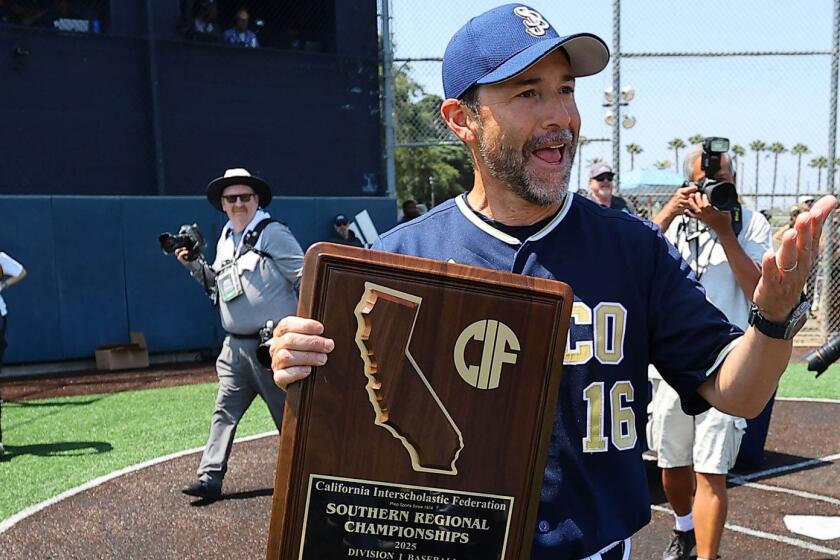Coliseum Rebuilding Plan Hits a Snag : Raiders: A state official says a contract would have to comply with environmental laws.
- Share via
A state environmental expert has warned that Los Angeles Memorial Coliseum authorities cannot enter into a contract with the Los Angeles Raiders to demolish and rebuild the stadium until they have complied fully with all environmental laws.
This raises the specter of lengthy delays in putting together a deal that would keep the Raiders in Los Angeles, increasing the chance that team owner Al Davis will take the Raiders to Oakland or Sacramento.
Both Northern California cities, the other leading candidates to land the franchise, are ahead of Los Angeles in preparing environmental impact reports, giving those cities what could be an edge in the competition.
Christine A. Sproul, assistant secretary for legal affairs in the state Resources Agency, said in an interview that she doubts that a plan to demolish and reconstruct the Coliseum would qualify for an exemption from the environmental assessment process.
Even if the Los Angeles Coliseum Commission declares that rebuilding the 67-year-old stadium would have no significant environmental consequences, public objections could force the commission to undertake a full-blown environmental study, which could take a year or more to complete.
Under the California Environmental Quality Act, “compliance with the environmental assessment requirements has to be provided before an agency makes a commitment to pursue the project,” Sproul said.
Sproul’s comments recall the situation the city of Irwindale confronted in 1987, when it sought to go ahead with a stadium building agreement with the Raiders without an environmental impact report. Opponents of the project took the matter to court, and an injunction was issued that forced Irwindale to suspend its plans for more than a year while a report was prepared.
When the report was completed, at a cost of more than $1 million, it indicated that Irwindale would have to spend $30 million more just to mitigate environmental damage at the primary stadium site. So the city decided to seek use of a privately owned secondary site. But that, in turn, compounded Irwindale’s financing problems.
Davis has said he wants a more compact stadium than the Coliseum, one containing luxury boxes and club seating that the current stadium lacks. The proposed capacity of the new stadium is 70,000, compared to the 92,655 the Coliseum presently holds.
In recent weeks, according to Coliseum sources, the stadium’s private managers, Spectacor Management and MCA Inc., have conducted exploratory talks in Sacramento seeking ways to speed up or bypass some of the procedures mandated by state law before the Coliseum could be demolished and rebuilt.
For instance, a meeting was recently held with Assembly Speaker Willie Brown (D-San Francisco) on the feasibility of fast legislative action to extend the joint powers agreement under which the Coliseum is administered by a commission composed of three representatives each of the city, the county and the state.
The joint powers agreement expires in 2005, and banks that might finance a big Coliseum project are believed certain to require an extension of another 5 to 15 years before loaning the money.
According to one source, Brown also was asked about the possibility of legislatively short-circuiting procedures mandating consultation with state historical preservation bodies. The Coliseum has been designated both a state and federal historical landmark, and it cannot be altered without such consultation.
A decade ago, the private organizers of the 1984 Los Angeles Olympic Games secured passage of legislation that exempted them from preparing environmental reports on new Olympic facilities. However, according to the source, Brown has not been asked to consider such legislation as regards the Coliseum.
A spokesman for Brown confirmed that the Speaker held a discussion with Spectacor representatives, telling them only that fast-track legislation could be passed in 45 to 90 days, if they could line up support.
Some time ago, Spectacor, which has been involved in proposed stadiums or indoor arenas in Santa Clara and Santa Ana as well as Los Angeles, retained the services of a Sacramento lobbyist, David Nagler.
Nagler said in an interview that he had not participated in the discussion with Brown, but that he has been involved in exploratory conversations on ways Coliseum managers can work with the state “to improve the Coliseum and enlarge the parking there.”
“No specific action has been agreed upon,” Nagler said.
He added that it would not be easy to obtain a legislative exemption from the environmental impact process. “A damn good case would have to be made for the exemption,” he said.
More to Read
Go beyond the scoreboard
Get the latest on L.A.'s teams in the daily Sports Report newsletter.
You may occasionally receive promotional content from the Los Angeles Times.










